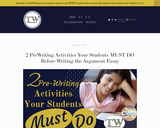
This resource details prewriting strategies for students to employ when writing arguments.
- Subject:
- English Language Arts
- Material Type:
- Lesson Plan
- Provider:
- Teachwriting.org
- Author:
- Teachwriting.org
- Date Added:
- 04/23/2019

This resource details prewriting strategies for students to employ when writing arguments.
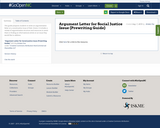
This guide prepares students to write an argumentative letter on a social justice issue of their choice. It includes a review of argumentative structure and resources to assist them in finding an informational article on an issue they would like to address.
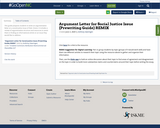
This guide prepares students to write an argumentative letter on a social justice issue of their choice. It includes a review of argumentative structure and resources to assist them in finding an informational article on an issue they would like to address.
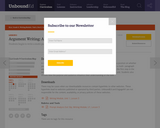
In this lesson, students will analyze an argument writing prompt and determine their approach to the writing task, focusing on how purpose and audience influence their understanding.
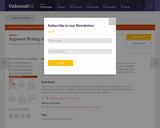
In this lesson, students will take a position on a writing prompt and analyze the best approach to creating a multi-paragraph argument using evidence to support their viewpoint.
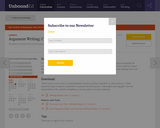
In this lesson, students will continue to gather evidence for their argument and work in small groups to organize their reading notes and identify pros and cons related to "Kids Still Getting Too Much 'Screen Time': CDC" by Amy Norton.
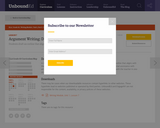
In this lesson, students will draft an argumentative outline that aligns with their statement of purpose.
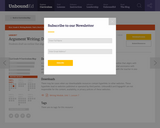
In this lesson, students will create an outline that aligns with their statement of purpose and have an opportunity to work with the teacher or other students in order to clarify their approach.
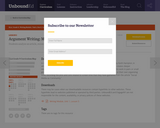
In this lesson, students will continue to pre-plan their argumentative essay, working on Pros and Cons Charts as they read and analyze the article "Social Media as Community" by Keith Hampton.
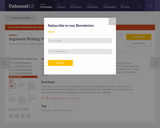
In this lesson, students will discuss the article, "Education 2.0: Never Memorize Again?" by Sarah Perez, focusing on pre-writing and organizing their writing according to task, purpose, and audience.
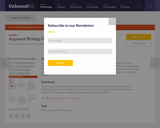
In this lesson, students will complete annotation and notes on the article "Education 2.0: Never Memorize Again?" By Sarah Perez. Students will review the task, purpose, and audience for their argument and participate in a prewriting activity.

In Lesson 5 (pages 88-91 of the pdf) from the unit Argumentative Writing and Research, students will focus on how writers evaluate and rank their claims in order to structure and create strong argumentative paragraphs.
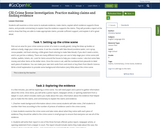
Students will examine a crime scene to evaluate evidence, make claims, explain which evidence supports those claims, and provide commentary to explain how the evidence supports the claims. They will provide a report at the end to show that they are able to make appropriate claims, provide sufficient support, and explain it all in great detail.
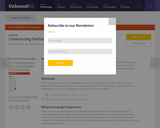
In this lesson, students will begin pre-planning by constructing an outline for their argument essay guided by the Argument Outline Tool. Students will determine a central claim and draw upon arguments that they have been discussing in supplemental texts throughout this module.
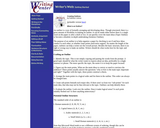
This resource walks students through the outlining process and gives suggestions for structuring their papers.
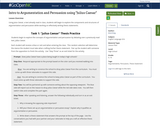
Using Juius Caesar, a text already read in class, students will begin to explore the components and structures of argumentation and persuasion while working on effectively writing thesis statements.
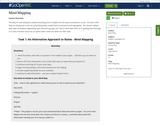
This way of note-taking has students working more in-depth into the topics presented in a text. The key is that they are diving into it and not just putting down simple facts to memorize and regurgitate. This doesn't always work with all students depending upon the learning type, but I like to work with them on it, guiding them through it, in class and then have it as an option when notes are taken at a later date.

In this resource, students will practice pre-writing techniques and learn how to move from organizing ideas through pre-writing to the actual composition of a paper.

This resource guides students through the prewriting (invention) process with guided questions and strategies to help generate a starting point and organization.
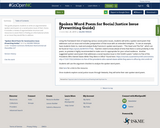
This guide prepares students to write an argumentative spoken word poem on a social justice issue of their choice. It includes a review of argumentative structure and resources to assist them in finding an informational article on an issue they would like to address.